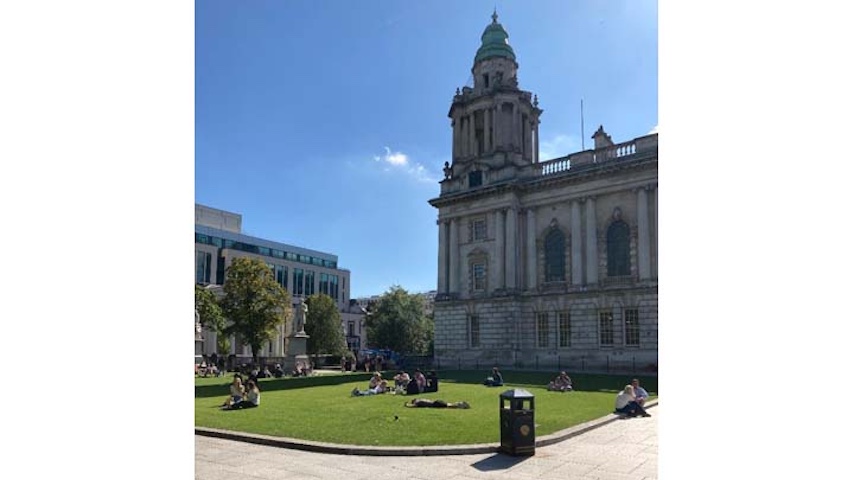The past several days have not been easy ones for Belfast. The city, like many in Great Britain and in Dublin, has been subject to racial violence and hatred. Journalists, like Amanda Ferguson, have done an outstanding job of chronicling the strife and turmoil that have plagued Belfast.
As we all know, Belfast has seen tougher days than the past few weeks. Belfast has seen violence and disorder in the past. Its people are resilient and tough. he citizens of Belfast will rise above these tough days.
What has been especially troubling to me is the fact that much of the strife has taken place in South Belfast, the part of town that I have called home. In August of 2022, I moved from the United States to South Belfast to pursue a master’s degree in conflict transformation and social justice at the Queen’s University’s program. My neighbourhood is incredibly diverse and amazingly welcoming. I have been welcomed by every section of the community in Belfast: from the faculty and staff at Queen’s to my advisor to my fellow students (from Belfast and around Ireland), and to literally every person I have met.
I was especially saddened to hear that my alma mater has decided to close today (August 9th) because of planned anti-immigration protests. I am not for one moment second-guessing the university’s decision. Nonetheless, it hurts my heart at the need to close the Queen’s campus. It is a bastion of multiculturalism and an example of the hard-won peace
South Belfast is an incredibly diverse neighbourhood. My two favourite restaurants are just down the Lisburn Road from my apartment. Roughly two blocks apart from each other sit the Bengal Brasserie and Café Fish. As you might expect from their names one of these restaurants specializes in Indian Food while the other focuses on traditional fish and chips. Both restaurants are equally good and most important of all both are equally integral parts of the community.
While the strife is harmful to everyone in Belfast, I can only try and imagine how hurtful it has been to those who have immigrated to Belfast from other parts of the world. So many of them must be quite understandably fearful for their personal safety. This wave of anti-immigrant violence is so ironic and painful for Ireland because for centuries its sons and daughters have fled oppression and hunger to emigrate to other countries. It is very hard to meet a resident of either Belfast or Dublin who does not have relatives in another country.
I have been encouraged by the political solidarity that has been shown by First Minister First Minister Michelle O’Neill and Deputy First Minister Emma Little-Pengelly. There is complete unanimity among all the political parties that the hatred and racism displayed on the streets of Belfast has no place in Northern Ireland.
In addition to the strong opposition from Northern Ireland’s political leaders, people in Belfast have taken to the streets of the city to say no to hate. Last Saturday, according to BBC reports:
The mob then moved towards the city’s university area. There they attacked three hotels, smashed windows and threatened journalists. Police sirens could be heard as the officers seemed to scramble to react to the violence. At each stage the crowd seemed to thin out. But another potential flashpoint lay ahead. Some headed towards the lower Ormeau Road — a mainly nationalist area in the city. As riot police raced towards the area, the local residents came out to chase the racist mob from the area.
As the BBC reports, the people of the lower Ormeau Road came out in force to almost literally draw a line in the stand and tell the world that Belfast rejects hatred and division. I am grateful to know many good people from this part of Belfast and I am proud to call many of them my friends. They are a community that knows first hand the violence that hatred and division can generate. The lower Ormeau Road community knows the long road that Belfast has travelled in the last thirty years. Last Saturday, they told the world that they are not going back.
I worry that the media reports may convince tourists to skip a visit to Belfast or students to not consider studying at Queen’s. If I could, I would urge them to reject the recent images they have seen in the media as being representative of Belfast. Instead, I would urge them to come to Belfast and experience the most wonderful and welcoming people on earth. I will give you an example. In my first week at Queen’s, I ordered a coffee at “the Junction,” a very busy coffee bar on the Queen’s University campus. One typically busy morning, I ordered my coffee and moved to the side to wait for my drink. A few moments later, the barista said “Martin” and I went over to pick up my beverage. Walking away, sipping my coffee, I just remembered that I had not given the barista my name. She had remembered it from my last visit. After roughly two visits, the barista knew my name. That is the kind of place Belfast is. It is a city where people remember your name and they are certainly glad you came to visit them. I have no doubt that the good citizens of Belfast, from every part of the community, will continue to stand tall against hate.

